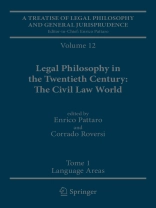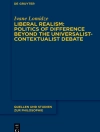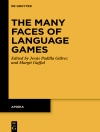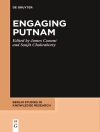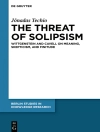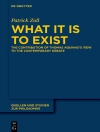A Treatise of Legal Philosophy and General Jurisprudence is the first-ever multivolume treatment of the issues in legal philosophy and general jurisprudence, from both a theoretical and a historical perspective. The work is aimed at jurists as well as legal and practical philosophers. Edited by the renowned theorist Enrico Pattaro and his team, this book is a classical reference work that would be of great interest to legal and practical philosophers as well as to jurists and legal scholar at all levels. The work is divided in two parts. The theoretical part (published in 2005), consisting of five volumes, covers the main topics of the contemporary debate; the historical part, consisting of six volumes (Volumes 6-8 published in 2007; Volumes 9 and 10, published in 2009; Volume 11 published in 2011 and Volume 12 forthcoming in 2016), accounts for the development of legal thought from ancient Greek times through the twentieth century.
Volume 12 Legal Philosophy in the Twentieth Century: The Civil Law World
Volume 12 of A Treatise of Legal Philosophy and General Jurisprudence, titled Legal Philosophy in the Twentieth Century: The Civil-Law World, functions as a complement to Gerald Postema’s volume 11 (titled Legal Philosophy in the Twentieth Century: The Common Law World), and it offers the first comprehensive account of the complex development that legal philosophy has undergone in continental Europe and Latin America since 1900. In this volume, leading international scholars from the different language areas making up the civil-law world give an account of the way legal philosophy has evolved in these areas in the 20th century, the outcome being an overall mosaic of civil-law legal philosophy in this arc of time. Further, specialists in the field describe the development that legal philosophy has undergone in the 20th century by focusing on three of its main subjects—namely, legal positivism, natural-law theory, and the theory of legal reasoning—and discussing the different conceptions that have been put forward under these labels. The layout of the volume is meant to frame historical analysis with a view to the contemporary theoretical debate, thus completing the Treatise in keeping with its overall methodological aim, namely, that of combining history and theory as a necessary means by which to provide a comprehensive account of jurisprudential thinking.
Tabla de materias
12.1.- A Note on the Authors.- Preface by the Editors of Volume 12; Enrico Pattaro and Corrado Roversi.- Enrico Pattaro and Corrado Roversi.-Part One – German-Speaking Countries.- Premise; Agostino Carrino and Hasso Hofmann.- Introduction: Philosophy of Law and Conceptions of the World; Agostino Carrino.- Chapter 1 – The Rebirth of Legal Philosophy within the Frame of Neo-Kantianism; Agostino Carrino.- Chapter 2 – Logistic Normativism: The Wiener rechtstheoretische Schule; by Agostino Carrino.- Chapter 3 – The Sociological Philosophy of Law as an Alternative to Normativism; Agostino Carrino.- Chapter 4 – From Criticism to the Phenomenology of Law; Giuliana Stella.- Chapter 5 – From the Criticism of Neo-Kantianism to Neo- Hegelianism in the Philosophy of Law; Agostino Carrino.- Chapter 6 – Law and the State in the Conservative Revolution; Agostino Carrino.- Chapter 7 – Marxism in the Philosophy of Law; Agostino Carrino.- Chapter 8 – From Normto Decision to the Concrete Order: The Legal Philosophy of Carl Schmitt; Agostino Carrino.- Chapter 9 – Nazi Philosophy of Law and of the State; Agostino Carrino.- Chapter 10 – The Development of German-Language Legal Philosophy and Legal Theory in the Second Half of the 20th Century; Hasso Hofmann.- Part Two – Southern European Countries And France.- Chapter 11 – Legal Philosophy in Italy in the 20th Century; Carla Faralli.- Chapter 12 – 20th-Century Legal Philosophy in France.- Chapter 13 – Political History of 20th Century Spanish Philosophy of Law; Benjamín Rivaya.- Chapter 14 – 20th-Century Legal Philosophy in Portugal; José de Sousa e Brito.- Chapter 15 – A Historical Survey of Legal Reasoning and Philosophy in Greece during the 20th Century; Constantinos Stamatis.- Part Three – Eastern European Countries.- Chapter 16 – 20th-Century Legal Theory and Philosophy in Poland; Tomasz Gizbert-Studnicki, Krzysztof Płeszka, Jan Woleński.- Chapter 17 – Russian Legal Philosophy in the 20th Century; Mikhail Antonov.- Chapter 18 – Czechoslovakia, the Czech Republic, the Slovak Republic: The 20th Century; Alexander Bröstl.- Chapter 19 – 20th-Century Legal Philosophy in Hungary; Csaba Varga.- Chapter 20 – 20th-Century Legal Philosophy in Other Countries of Eastern Europe.- Part Four – Nordic And Low Countries.- Chapter 21 – Sweden: Legal Philosophy in the 20th Century; Uta Bindreiter.- Chapter 22 – 20th Century Legal Philosophy in Denmark; Henrik Palmer Olsen.- Chapter 23 – Legal Philosophy in Norway in the 20th Century; Svein Eng.- Chapter 24 – Legal Theory and Philosophy of Law in Finland in the 20th Century; Susanna Lindroos-Hovinheimo.- Chapter 25 – Legal Philosophy in the Low Countries; Mark Van Hoecke and Arend Soeteman.- Part Five – Latin America.- Chapter 27 – Philosophy of Law in Brazil in the 20th Century; Ronaldo Macedo and Carla Henriete Bevilacqua Piccolo.- Chapter 28- 20th-Century Legal Philosophy in Other Countries of Latin America; Rodolfo Vázquez.- Bibliography.- Index of Subjects.- Index of Names.
12.2.- A Note on the Authors.- Part One – Natural Law Theory.- Chapter 1 – Introduction; Francesco Viola.- Chapter 2 – Natural Law in Germany in the 20th Century; Stephan Kirste.- Chapter 3 – Twentieth-Century Philosophy of Natural Law in France; Stamatios Tzitzis.- Chapter 4 – Natural Law Theory in Spain and Portugal; Antonio-Enrique Pérez Luño.- Chapter 5 – Natural Law Theory in Italy; Francesco Viola.- Chapter 6 – Natural Law in Hungary; Máté Paksy and Csaba Varga.- Chapter 7 – The Natural Law Theory of the 20th Century Latin America; Carlos I. Massini Correas.- Part Two – Legal Positivism.- Chapter 8 – Legal Positivism in the First Half of the 20th Century; Mauro Barberis and Giorgio Bongiovanni.- Chapter 9 – The Postwar Debate; Mauro Barberis and Giorgio Bongiovanni.- Chapter 10 – Neo-Constitutionalist Challenges to Legal Positivism.- Mauro Barberis and Giorgio Bongiovanni.- Chapter 11 – Legal Positivism’s Answers to the Neoconstitutionalist Challenge; Mauro Barberis.- Part Three – Legal Realism.- Chapter 12 – Introduction: Continental Legal Realism; Edoardo Fittipaldi.- Chapter 13 – Axel Hägerström at the Origins of the Uppsala School; Enrico Pattaro.- Chapter 14 – Karl Olivecrona’s Legal Philosophy; Torben Spaak.- Chapter 15 – Anders Vihelm Lundstedt: in Quest of Reality; Uta Bindreiter.- Chapter 16 – Alf Ross’s Legal Philosophy; Mauro Zamboni.- Chapter 17 – Other Scandinavian Legal Realists.- Chapter 18 – Leon Petrażycki’s Theory of Law; by Edoardo Fittipaldi.- Chapter 19 – Jerzy Lande; Edoardo Fittipaldi.- Chapter 20 – Other Russian or Polish Legal Realists.- Part Four – Legal Reasoning.- Introduction: A Note on Terminology and Purpose; Pierluigi Chiassoni and Eveline Feteris.- Chapter 21 – The Heritage of the XIXth Century: The Age of Interpretive Cognitivism; Pierluigi Chiassoni.- Chapter 22 – The Age of Discontent: The Revolt against Interpretive Cognitivism; Pierluigi Chiassoni.- Chapter 23 – Taking Stock of the Past: Rhetoric, Topics, Hermeneutics; Pierluigi Chiassoni.- Chapter 24 – The Age of Analysis: Logical Empiricism, ordinary Language, and the Simple Truth of the Matter; Pierluigi Chiassoni.- Chapter 25 – Advancing Reason to Its Further Borders; Eveline Feteris.- Chapter 26 – Law and Logic in the 20th Century; Jan Wolenski.- Chapter 27 – Recent Developments in Legal Logic; Antonino Rotolo and Davide Grossi.- Bibliography.- Index of Subjects.- Index of Names.
Sobre el autor
ENRICO PATTARO
University of Bologna, Italy
Born in Rome on April 8, 1941. Graduated summa cum laude in law from the University of Bologna, 1964, with a dissertation on Hans Kelsen and Alf Ross. Libero docente (Habilitationsschrift) in the philosophy of law, 1971. Was awarded a position as full professor in legal philosophy through a national 1975 competition for a professorship in Italy. Tenured professor in legal philosophy at the Bologna University School of Law. Served as dean of the Bologna University School of Law from 1977 to 1979, and then as member of the Bologna University Board of Directors from 1980 to 1989.
Main research fields: Legal philosophy, general jurisprudence, the history of legal ideas, and computer science and law. Author of over two hundred publications. Main speaker at national and international conferences. Invited speaker at universities in Western and Eastern Europe, Latin America, and the United States.
1982–1989. Promoted (with others) and served as member of the Ph.D. programme in Analytic Philosophy and Legal Theory of the University of Milan. Coordinator: Uberto Scarpelli.
1983–1990. Served as member of the International Statutory Interpretation Project, Cornell University School of Law, USA. Coordinators: Neil Mac Cormick (University of Edinburg, UK) and Robert S. Summers (Cornell University, USA).
1986. Founded CIRSFID—Bologna University Interdisciplinary Centre for Research in the History, Sociology, and Philosophy of Law and in IT Law and Legal Informatics—serving as the centre’s director from 1986 to 1999, and from 2006 to the present.
1986–1995. Served as member of the advisory board of the Center for Semiotic Research in Law, Government, and Economics, Pennsylvania State University, Reading, Pa. Founder: Roberta Kevelson.
1987. Founded Ratio Juris: An International Journal of Jurisprudence and Philosophy of Law (Oxford and Cambridge, Mass.: Basil Blackwell), serving as editor-in-chief from 1987 to 2001. Original Committee of Advisors: Hans Albert (University of Mannheim, Germany), Norberto Bobbio (University of Turin, Italy), H. L. A. Hart (University of Oxford, UK), and Georg H. von Wright (Finnish Academy of Science, Finland). Current Committee of Advisors: Hans Albert (University of Mannheim, Germany), Ronald Dworkin (University College London, UK), Enrico Pattaro (University of Bologna, Italy), and John Searle (University of California at Berkeley, USA).
1989. Cofounded the European Association for the Teaching of Legal Theory, based in Brussels, and have since sat on the board of directors.
1989. Founded the Bologna University Ph.D. Programme in Legal Informatics and Information-Technology Law, serving as coordinator until 2000.
1989–present. Member of the Bologna Academy of Sciences.
1989–present. Served as member of the advisory committee of the Istituto de Derechos Humanos “Bartolomé de las Casas, ” Universidad Carlos III de Madrid, Madrid. Founder: Gregorio Peces-Barba (Spain).
1992–present. Served as member of the advisory committee of Anuario de Filosofía Jurídica y Social, Sociedad Chilena de Filosofía Jurídica y Social, Valparaiso (Chile).
1992–present. Served as member of the editorial board of Artificial Intelligence and Law, Berlin–Dordrecht–Heidelberg–New York: Springer.
1995–99. Served as president of IVR, Internationale Vereinigung für Rechts- und Sozialphilosophie (International Association for the Philosophy of Law and Social Philosophy), founded in 1909. Vice presidents during the same period: Eugenio Bulygin (Argentina), Mikael Karlsson (Iceland), Rex Martin (USA), and Aleksander Peczenik (Sweden).
1997–1999. Chaired the Jurists’ Team of the Euro Committee appointed by the Italian government to draft the statutory instruments and delegated legislation on the changeover to a single European currency (the euro).
1998. Conceived and carried out the Irnerius Project, digitally reproducing and making available on the Web the medieval glossators’ and commentators’ manuscript codices of the Reale Collegio di Spagna in Bologna (the database is online at http://irnerio.cirsfid.unibo.it and now counts 138, 908 leaves).
1999–present. Honorary president of IVR, Internationale Vereinigung für Rechts- und Sozialphilosophie (International Association for the Philosophy of Law and Social Philosophy), founded in 1909.
2001. Promoted the Master’s course in Legal Informatics and Information-Technology Law, Bologna University School of Law, part of the European Legal Informatics Study Programme (EULISP) consortium. Other universities in the consortium: Strathclyde University Glasgow, UK; Leibniz Universität Hannover, Germany; Katholieke Universiteit Leuven, Belgium, Queen Mary University of London, UK; Université Notre-Dame de la Paix Namur, France; Universitetet i Oslo, Norway; Lapin Yliopisto Rovaniemi, Finland; Stockholms Universitet, Sweden; Universität Wien, Austria; and Universidad de Zaragoza, Spain.
2001–present. Conceived A Treatise of Legal Philosophy and General Jurisprudence, 12 vols. (Dordrecht, Berlin, Heidelberg, New York: Springer), serving as editor-in-chief. Associate Editors: Gerald J. Postema (The University of North Carolina at Chapel Hill, USA), Peter G. Stein (University of Cambridge, UK). Advisory Board: Norberto Bobbio (University of Turin, Italy), Ronald M. Dworkin (New York University, USA, and University College London, UK), Lawrence M. Friedman (Stanford University, USA), and Knud Haakonssen (University of Sussex, UK).
2004–2008. President of the Italian Association for Legal Philosophy (formerly called Italian Association for Legal and Political Philosophy), based in Rome. Vice presidents during the same period: Vincenzo Ferrari (University of Milan) and Francesco Viola (University of Palermo).
2007–present. Served as member of the editorial board of Studii de drept romanesc (Legal Romanian Studies), Bucharest, Romania.
2008. Founded the Italian Society for Law and Literature (www.lawandliterature.org), currently serving as its honorary president.
2008–present. Served as member of the editorial board of the International Journal for the Semiotics of Law, Berlin–Dordrecht–Heidelberg–New York: Springer.
Corrado Roversi
Bologna University School of Law
Corrado Roversi is assistant professor in Legal Philosophy at the University of Bologna. He holds a Ph.D. in Analytic Philosophy and General Jurisprudence from the University of Milan. He is a member of CIRSFID (Centre for Research in the History, Philosophy, and Sociology of Law, and in Computer Science and Law) at the University of Bologna, and assistant editor of Ratio Juris: An International Journal of Jurisprudence and Philosophy of Law (Wiley-Blackwell). His main interests are in social and legal ontology, the theory of norms and normativeness, and the philosophy of normative language. Among his publications are “On Constitutive Normativity”, in The Normativity of Law, eds. S. Bertea and G. Pavlakos (Oxford: Hart Publishing, forthcoming); “Constitutive Rules in Context, ” Archiv für Rechts- und Sozialphilosophie 96: 223-38 (2010); “Inferentialism, Social Practices, and the Connection between Law and Morality, ” coauthored with G. Bongiovanni and A. Rotolo, in The Rules of Inference. Inferentialism in Law and Philosophy, eds. D. Canale and G. Tuzet, 45-72, Milan: EGEA (2009); “Performative Contradictions and Norm-enactment, ” coauthored with A. Rotolo, Ratio Juris 22: 455-82 (2009); “The Structure of Social Practices and the Connection between Law and Morality, ” coauthored with G. Bongiovanni, A. Rotolo, C. Valentini, Ratio Juris 22: 1-23 (2009); “Constitutionalism and Transcendental Arguments, ” Northern Ireland Legal Quarterly 59: 109–24 (2008); “The Claim to Correctness and Inferentialism: Alexy’s Theory of Practical Reason Reconsidered, ” coauthored with G. Bongiovanni and A. Rotolo, in Law, Rights and Discourse, edited by G. Pavlakos, 275–300 (Oxford: Hart Publishing, 2007).
